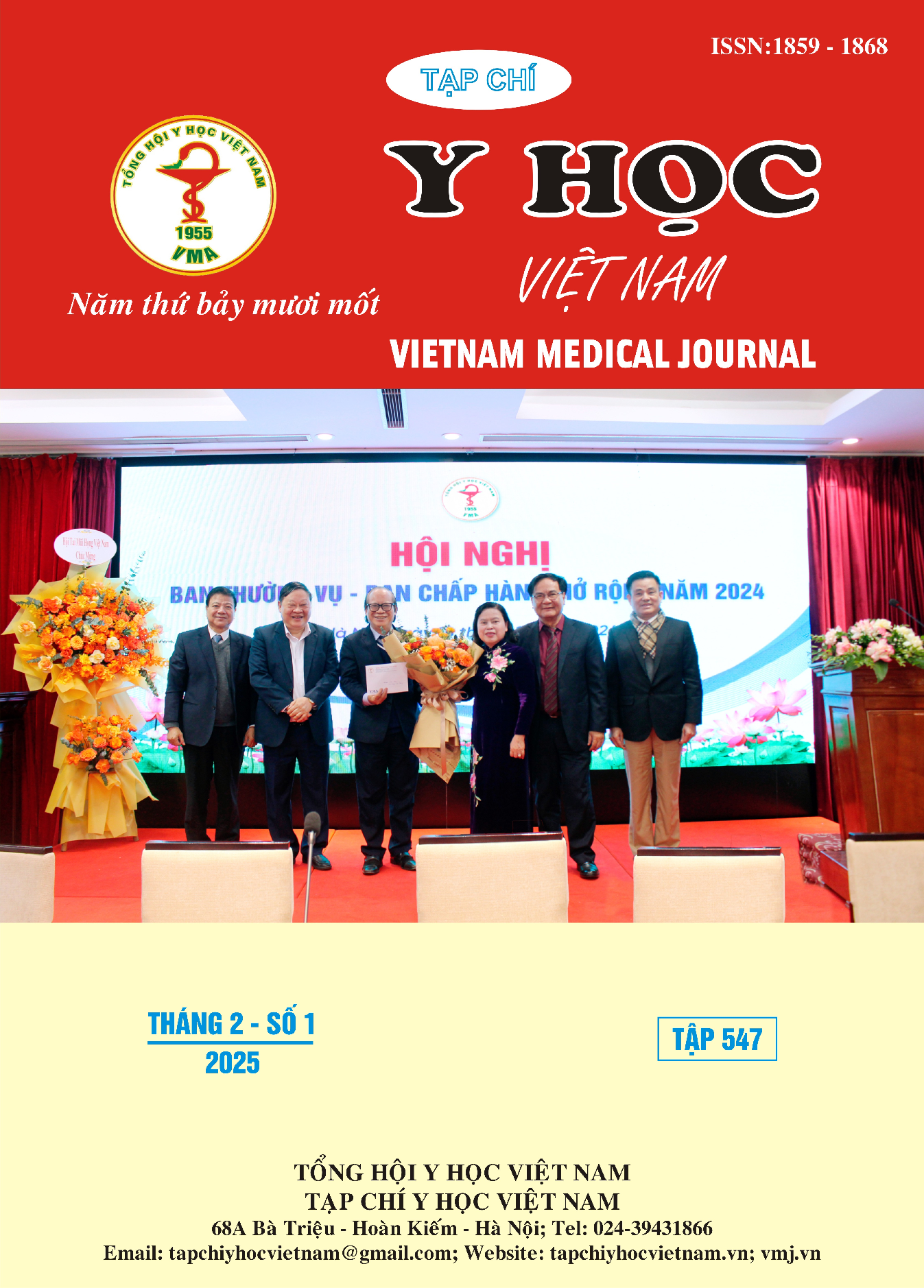THE ANXIETY OF PARENTS BEFORE CONGENITAL HEART SURGERY AND SOME RELATED FACTORS AT HANOI HEART HOSPITAL
Main Article Content
Abstract
Objective: The study aims to determine the prevalance and level of anxiety of young parents before congenital heart surgery and some related factors at Hanoi Heart Hospital. Method: Cross-sectional study design on 252 parents of children under 16 years old diagnosed with congenital heart disease with surgery indications at Hanoi Heart Hospital from September 2023 to September 2024. Parents' anxiety was measured by the Vietnamese version of The State-Trait Anxiety Inventory (STAI) anxiety scale consisting of 20 questions. Results: The average age of the group of parents participating in this study was 32.1 years old; the rate of mothers participating in child care was higher than that of fathers (59.5% vs. 40.5%). The majority of parents participating in the study had a high school education level (36.9%) and were self-employed (44.4%). The overall rate of parental anxiety within 24 hours before the child's surgery was 56.7%. Logistic regression models analyzing the association between parental characteristics and anxiety showed that: the group of parents with less than high school education had a 2.7 times higher risk of anxiety than the group of parents with high school education or higher (aOR=2.7; 95% CI: 1.24 - 6.04); the group of parents whose children were hospitalized for the first time had a 3.6 times higher risk of anxiety than the group of parents whose children had been hospitalized for inpatient treatment 2 or more times (aOR=3.6; 95% CI: 1.48 - 8.75); Parents with high anxiety personality traits were 5 times more likely to be anxious before their child's surgery than parents with low or no anxiety personality traits (aOR=0.2; 95% CI: 0.08-0.31). Conclusion: Most young parents were anxious before their child had congenital heart surgery.
Article Details
Keywords
Anxiety; parents of young children congenital heart surgery, related factors
References
2. Green, A., Lee, P., & Kim, S. (2020). Ethnic disparities in parental anxiety and access to healthcare services. Public Health Journal, 45(3), 205-212. https://doi.org/10.1016/j.puhj.2019. 12.003
3. Harrison, M., Martinez, A., & Nguyen, T. (2019). The impact of clear communication on parental anxiety in pediatric settings. Healthcare Communication Research, 12(1), 45-57. https://doi.org/10.1177/123456789
4. Hoffman, B., Wang, L., & Johnson, R. (2018). Socioeconomic and educational factors affecting parental stress in hospital environments. International Journal of Healthcare Studies, 14(4), 289-298.
5. Johnson, P., & Wang, T. (2018). Factors influencing parental anxiety in pediatric care: A cross-sectional study. BMC Pediatrics, 18(1), 210. https://doi.org/10.1186/s12887-018-1167-3
6. Kim, Y., Lee, S., & Park, H. (2021). Parental stress and anxiety: The role of child’s age and medical complexity. Pediatric Psychology Quarterly, 36(1), 12-25. https://doi.org/10.1037/ ppm0000456
7. Lee, R., Martinez, J., & Kim, S. (2019). The role of personality traits in predicting parental anxiety. Psychology and Health, 34(7), 835-848. https://doi.org/10.1080/08870446.2019.1603385
8. Martinez, A., Brown, P., & Nguyen, T. (2017). Financial assistance and parental stress in pediatric healthcare. Social Work in Health Care, 56(8), 684-698. https://doi.org/10.1080/ 00981389.2017.1328460
9. Nguyễn, T. M., Trần, Q. H., & Lê, V. N. (2020). Mối liên quan giữa lo lắng của cha mẹ và tình trạng sức khỏe của trẻ mắc bệnh tim bẩm sinh. Tạp chí Y học Việt Nam, 465(12), 34-45.
10. Smith, J., & Jones, R. (2018). Gender differences in parental anxiety: A meta-analysis. Journal of Family Studies, 28(3), 212-225. https://doi.org/10.1177/1544417318


